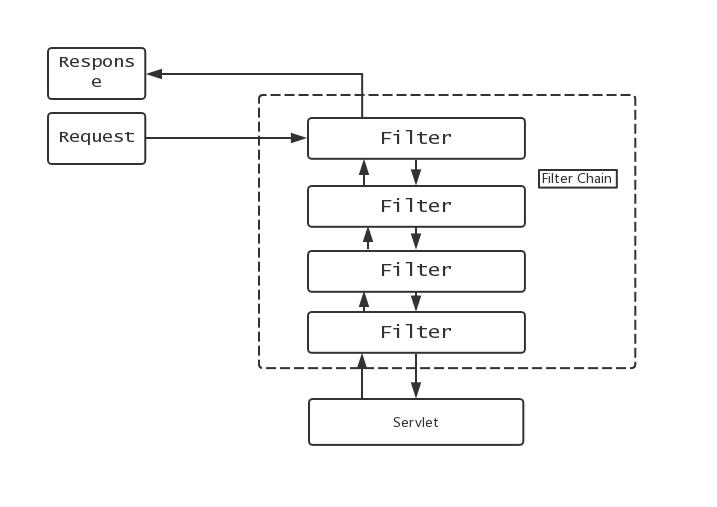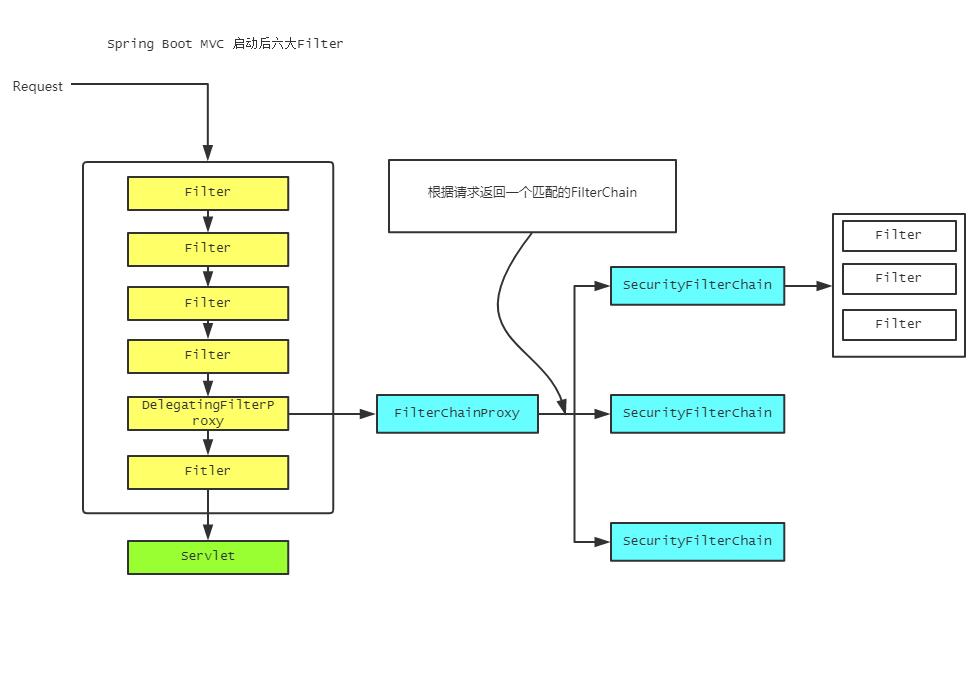Spring Security介绍
- 开源
- 提供企业级的安全认证和授权
Spring安全拦截器
-
认证管理器
-
认证模式
-
Basic
HTTP 1.0中使用的认证方法,使用用户名和密码Base64编码的方式
浏览器弹出对话框,用户输入用户名和密码,加入头部
无状态
安全性不足
-
Digest
解决安全性问题
浏览器对用户名和密码请求方法,URL等进行MD5运算,发送到服务器
服务器获取到用户名密码,请求方法,URL等MD5运算,查看是否相等
安全性问题依然存在
-
X.509
-
-
-
访问决策管理器
-
运行身份管理器
常用权限拦截器
Spring-Security拦截器链流程图

介绍几个常用的Filter
-
SecurityContextPersistenceFilter
基于ThreadLocal
-
LogoutFilter
发送注销请求时,清空用户的session,cookie,重定向
-
AbstractAuthenticationProcessingFilter
用户登录的请求
-
DefaultLoginPageGeneratingFilter
生成登录页面
-
BasicAuthencationFilter
-
SecurityContextHolderAwareRequestFilter
包装,提供额外的数据
-
RememberMeAuthemticationFilter
提供RememberMe功能,当cookie中存在rememberme时,登录成功后生成唯一cookie
-
ExceptionTranlationFilter
请求到对应的页面,响应异常
ExceptionTranslationFilter异常处理过滤器,该过滤器用来处理在系统认证授权过程中抛出的异常(也就是下一个过滤器
FilterSecurityInterceptor),主要是 处理AuthenticationException和AccessDeniedException -
SessionManagerFilter
-
FilterSecurityInterceptor(授权)
用户没有登录,抛出未登录异常
用户登录,但是没有权限访问该资源,抛出拒绝访问的异常
用户登录,有权限,则放行
此过滤器为认证授权过滤器链中最后一个过滤器,该过滤器之后就是请求真正的 服务
Filter如何执行
FilterChainProxy会按照顺序调用一组Filter,完成授权验证
请求首先经过Servlet Filter链,这里面包含6个Filter

可以看到如下的一个Filter
ApplicationFilterConfig[name=springSecurityFilterChain, filterClass=org.springframework.boot.web.servlet.DelegatingFilterProxyRegistrationBean$1]
这个就是Spring Security Filter的入口,它的类型是DelegationFilterProxy
那么,这个DelegationFilterProxy到底执行了什么样的操作呢?可以简单看一下源码
重点看一下部分的源码:
public class DelegatingFilterProxy extends GenericFilterBean {
// 类中的属性
@Nullable
private String contextAttribute;
@Nullable
private WebApplicationContext webApplicationContext;
@Nullable
private String targetBeanName;
private boolean targetFilterLifecycle = false;
/**
* 重点在于这个属性
*/
@Nullable
private volatile Filter delegate;
private final Object delegateMonitor = new Object();
@Override
public void doFilter(ServletRequest request, ServletResponse response, FilterChain filterChain)
throws ServletException, IOException {
// Lazily initialize the delegate if necessary.
Filter delegateToUse = this.delegate;
if (delegateToUse == null) {
synchronized (this.delegateMonitor) {
delegateToUse = this.delegate;
if (delegateToUse == null) {
WebApplicationContext wac = findWebApplicationContext();
if (wac == null) {
throw new IllegalStateException("No WebApplicationContext found: " +
"no ContextLoaderListener or DispatcherServlet registered?");
}
delegateToUse = initDelegate(wac);
}
this.delegate = delegateToUse;
}
}
// Let the delegate perform the actual doFilter operation.
invokeDelegate(delegateToUse, request, response, filterChain);
}
// .......
/**
* Initialize the Filter delegate, defined as bean the given Spring
* application context.
* <p>The default implementation fetches the bean from the application context
* and calls the standard {@code Filter.init} method on it, passing
* in the FilterConfig of this Filter proxy.
* @param wac the root application context
* @return the initialized delegate Filter
* @throws ServletException if thrown by the Filter
*/
protected Filter initDelegate(WebApplicationContext wac) throws ServletException {
String targetBeanName = getTargetBeanName();
Assert.state(targetBeanName != null, "No target bean name set");
Filter delegate = wac.getBean(targetBeanName, Filter.class);
if (isTargetFilterLifecycle()) {
delegate.init(getFilterConfig());
}
return delegate;
}
// 调用delegate的doFilter方法
protected void invokeDelegate(
Filter delegate, ServletRequest request, ServletResponse response, FilterChain filterChain)
throws ServletException, IOException {
delegate.doFilter(request, response, filterChain);
}
}
根据以上代码的注释我们可以看出大概的执行流程
那类中的Filter delegate是什么呢?断点调式运行可以找到以下东西

这是Spring Security 提供的一个FilterChainProxy,关注其中的关键源码
public class FilterChainProxy extends GenericFilterBean {
// 包含一组SecurityFilterChain
private List<SecurityFilterChain> filterChains;
@Override
public void doFilter(ServletRequest request, ServletResponse response,
FilterChain chain) throws IOException, ServletException {
boolean clearContext = request.getAttribute(FILTER_APPLIED) == null;
if (clearContext) {
try {
request.setAttribute(FILTER_APPLIED, Boolean.TRUE);
doFilterInternal(request, response, chain);
}
finally {
SecurityContextHolder.clearContext();
request.removeAttribute(FILTER_APPLIED);
}
}
else {
doFilterInternal(request, response, chain);
}
}
private void doFilterInternal(ServletRequest request, ServletResponse response,
FilterChain chain) throws IOException, ServletException {
FirewalledRequest fwRequest = firewall
.getFirewalledRequest((HttpServletRequest) request);
HttpServletResponse fwResponse = firewall
.getFirewalledResponse((HttpServletResponse) response);
// 根据请求获取匹配的一组Filter
// 这里返回的Filter就是上述的那些AuthenticationFilter,比如UsernamePasswordAuthenticationFilter
List<Filter> filters = getFilters(fwRequest);
if (filters == null || filters.size() == 0) {
if (logger.isDebugEnabled()) {
logger.debug(UrlUtils.buildRequestUrl(fwRequest)
+ (filters == null ? " has no matching filters"
: " has an empty filter list"));
}
fwRequest.reset();
chain.doFilter(fwRequest, fwResponse);
return;
}
VirtualFilterChain vfc = new VirtualFilterChain(fwRequest, chain, filters);
vfc.doFilter(fwRequest, fwResponse);
}
/**
* Returns the first filter chain matching the supplied URL.
*
* @param request the request to match
* @return an ordered array of Filters defining the filter chain
*/
private List<Filter> getFilters(HttpServletRequest request) {
for (SecurityFilterChain chain : filterChains) {
if (chain.matches(request)) {
return chain.getFilters();
}
}
return null;
}
}
到此,我们可以总结出如下的流程图:
